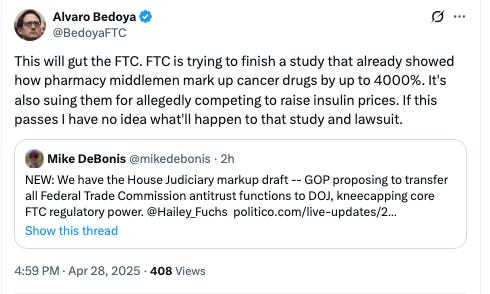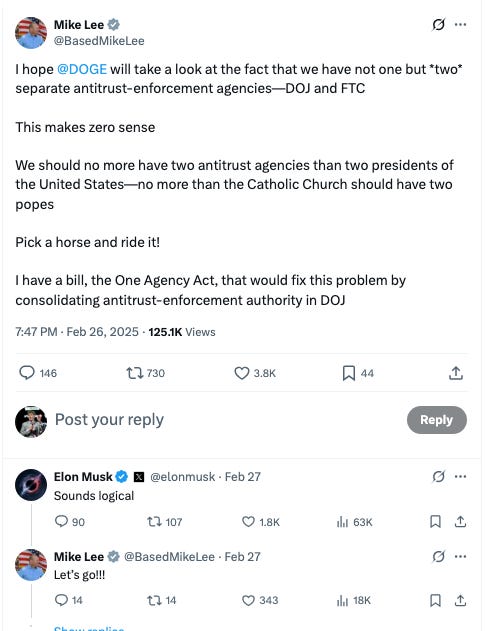House GOP Proposes Eliminating Key Antitrust LawHouse Judiciary Chair Jim Jordan released a bill to move all antitrust work from the Federal Trade Commission to the Department of Justice, deleting a key antitrust law. PBMs and Amazon could benefit.News just broke that House Republican Judiciary Chair Jim Jordan, who has always disliked antitrust law, is proposing to use the budget process to roll back a key law in this area. The specific provision at issue is Section 5 of the FTC Act, which prohibits “unfair methods of competition.” On Wednesday, he’s holding a committee hearing to roll back this authority through a strange legislative maneuver. I’m doing a bit of a quick legal read, but this is a rushed process, so I want to get it out now. I believe this change could be significant. Recently, Section 5 was used to litigate against pharmacy benefit managers. It’s in the antitrust case against Amazon, another case against Corteva/Syngenta over exclusive dealing in seeds and chemicals, and it was the authority used to ban non-compete agreements. These cases, as well as every consent decree ever reached under Section 5, are now at risk. To understand why, we have to start by looking at this unusual law. Section 5 is unique to the Federal Trade Commission, neither the Antitrust Division nor private litigants have jurisdiction to use it. It encompasses the Sherman Act, but it can also go beyond it. It’s intended to be broad-ranging but relatively weak, to allow an expert body - aka the FTC - to reach to new business practices. This area of law has been used for more than a hundred years to address illegal commissions, firms spying on rivals, sabotage, messing around with patents or regulations, and addressing mergers or exclusive arrangements that didn’t quite meet Sherman or Clayton Act standards. Anyway, one of the complaints from libertarians has always been that the Antitrust Division and the Federal Trade Commission are overlapping and redundant, since they both enforce antitrust laws. There’s a reason for the redundancy, they have different standards and authority. The Antitrust Division has criminal jurisdiction, the FTC does not. The FTC is an expert agency with broader yet weaker enforcement capacity, the DOJ is narrower but stings harder. The FTC is a multi-member bipartisan commission that generates broader consensus, the DOJ answers to the President. It is not, in other words, a bad thing that there are two enforcers, it’s a good thing. Redundancy means more enforcement, not less. When the FTC deadlocked on litigating against Microsoft, for instance, the Antitrust Division took over. On Wednesday, Jim Jordan is marking up a bill that would move all antitrust authority and staff out of the FTC to the DOJ. It would shut down the Bureau of Competition at the FTC, and end the ability of the FTC to accept merger filing forms. All FTC antitrust staff and capacity would move to the Antitrust Division, leaving just consumer protection work remaining. Politico got a copy of the bill here. It’s not just a bill to change the office locations and reporting structures. The bill does NOT transfer the Section 5 “unfair methods of competition” authority to the DOJ. That authority remains with an agency that has no staff and no capacity to litigate, which means it could die. There are possibly legal avenues I’m not thinking of, and perhaps I’m misreading it or the bill could change, but I’m worried. According to this legislative draft, after a transition period, the DOJ will get the ability to run existing cases, if Attorney General Pam Bondi approves. That means Bondi can eliminate whatever she wants. But that’s not the real problem, as, well, that’s just what it means to have people in positions in authority. The problem is that this legislation could accidentally kill a whole swath of antitrust action because of the sloppy way it’s written. This bill is not a normal change to antitrust law, it’s part of a budgetary process called reconciliation, which is designed to avoid procedural obstacles in the Senate. But a reconciliation bill can’t change certain administrative authorities directly, but must focus only on revenue and spending. So this bill accomplishes its legal change solely by moving money and people from one agency to another. And therein lies the problem. The bill is written to say that the DOJ can continue existing FTC cases. But the Justice Department can only do what it’s authorized to do, and it is not authorized to pursue cases barring “unfair methods of competition,” like the case against PBMs. A normal piece of legislation could just grant such authority temporarily, but again, that’s not possible in reconciliation. If this bill passed, and I were a lawyer for UnitedHealth Group or Amazon, I’d be filing a complaint demanding the case against my client be dismissed, since no one has the authority to litigate it. There are other legal authorities that will wither. All consent decrees reached under Section 5 competition authority, which are managed by the FTC, would be in a legal gray area. Standards on merger law, which are slightly different between the two agencies, would now be oriented around the DOJ’s higher burden of proof. The FTC’s ability to investigate industries and write reports, known as Section 6(b), is also likely toast. That’s a huge deal in and of itself, because Section 6(b) is the main investigative method to look into industry structure availed by Congress for the past hundred plus years. And the DOJ didn’t, as far as I can tell, get the authority to continue it! Similarly, the Robinson-Patman Act against price discrimination, while technically enforceable by the DOJ, hasn’t been enforced by that department since 1977. And the FTC still has the authority to promulgate rules around merger filing, even though its ability to get those filings is now gone. That makes no sense. This whole thing is sloppy, essentially an attempt to “Delete the FTC” without repealing the FTC Act. So why seek to eliminate Section 5? There’s a long backstory. Technically, the Clayton Act and Sherman Act when used by the FTC go through Section 5, but the part that’s being repealed are the elements outside of the Clayton and Sherman Acts. In 2023, I had a debate at the American Bar Association Antitrust Section spring conference, and unfair methods of competition was the bitter object of dispute. The reason is that antitrust defense lawyers and economists absolutely despise the idea of ‘fairness’ being put into statute. And they succeeded in putting Section 5 into disuse, until the FTC under Lina Khan brought it back.
Utah Senator Mike Lee is the brainchild behind the attack. He’s been pushing his One Agency Act for years, which would merge these two agencies. Libertarians, who have significant influence over Lee, have always hated Section 5, because they do not like the idea of fairness being in statute. In February, Lee got Elon Musk to endorse his proposal on Twitter. The markup of this proposal is on Wednesday, and it will face heavy opposition from Democrats. And normally the Democrats in the Senate could stop it, even if those in the House could not. But it’s on reconciliation, so there are weird parliamentary questions involved. Ultimately, this is a badly written law pushed by ideologues who perceive big businesses as good for Republicans. The key figure behind it is Jim Jordan, and he’s an important conservative leader. He’s never liked antitrust, but we’ll see how much support he has within the GOP caucus writ large. For a few years, it looked like a few conservatives in Congress had started to understand that consolidated market power was a threat to the American way of life, with a few members here and there recognizing that dominant corporations can easily turn against anyone. I guess we’ll soon see if there’s any spark of that left. This is a free post of BIG by Matt Stoller. If you liked it, please sign up to support this newsletter so I can do in-depth writing that holds power to account. |



